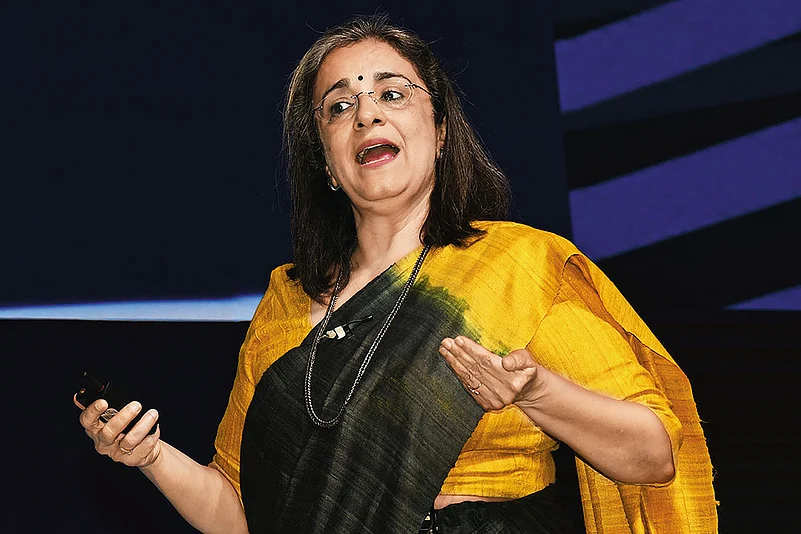When Madhabi Puri Buch took over as the chairperson of the Securities and Exchange Board of India (SEBI) in March, the capital market regulatory body was already in the spotlight for its handling of governance lapses at the National Stock Exchange, the country’s largest stock exchange. As the new chairperson, she is clear that she wants to bring more transparency into the system. Not just that, she wants SEBI to become a tech-savvy body too and use technology for pushing accountability.
People who have observed Buch at the workplace say that she is meticulous, pays attention to detail and goes into the granularity of an issue before taking important decisions.
She is not new to SEBI. In her earlier stint with the market regulator, she was its whole-time member from April 2017 to October 2021. She oversaw a broad range of portfolios that stretched from regulation and surveillance of markets and market intermediaries to economic and policy analysis as well as the National Institute of Securities Markets, which was set by SEBI, and matters related to information technology. “She comes with a wealth of experience and vast knowledge of financial markets. She understands the pulse of the market and knows what needs to be prioritised. Her quick decision-making ability makes her the perfect boss in office,” says one of her former colleagues.
Making Regulator Tech Ready
Not a fan of approximation, the mathematics graduate from the prestigious St. Stephen’s College in Delhi, who also has a post-graduate management degree from the Indian Institute of Management, Ahmedabad, is particular about absolute numbers, says another ex-colleague, adding, “she gets into every minute detail when it comes to data”.
“Do not underestimate the power of visualisation. Data can deliver desired results when you visualise it in a right way”: this is one of Buch’s work philosophies which echoes in the corridors of SEBI these days.
Besides her data-driven approach to decision making, Buch is known for her inclination towards modern technology. During her previous stint with the regulator, she made efforts to push junior staffers to extensively use modern tools, particularly for data analysis. She also headed a technology panel that explored solutions for early detection of market anomalies. The regulator ended up developing an in-house algorithm for this purpose.
She not only wants a full-scale tech integration within SEBI, she pushes other stakeholders towards it as well. At an event organised by the Indian Audit and Accounts Department in October, she underlined the importance of technology-driven third-party validation for auditing processes. She said, “SEBI’s thrust on third-party validation is driven by the commitment to ensure a true and fair picture of whatever is presented in the markets.”

Responsible Corporate Behaviour
Buch understands that SEBI needs to build immunity against front-running, information asymmetry, insider trading, fraudulent transaction, manipulation of stock price and lack of disclosures. In September, “to protect the interests of investors in securities to promote the development of, and to regulate the securities markets”, SEBI issued a warning against “unregulated platforms offering algorithmic trading”. While it did not ban algorithmic trading, it directed stock brokers to desist from publishing “past or expected future return/performance of the algorithm” or dealing with platforms providing such references. The regulatory body has also enforced standardisation of rating scales used by credit rating agencies and many other disclosure norms.
Within two months of Buch taking charge, SEBI formed an advisory committee for environmental, social and governance (ESG) parameters for matters pertaining to the securities markets. The committee is expected to review leadership indicators that may be made essential, including those related to value chain along with developing sector-specific sustainability disclosures. It is also required to assess the ongoing improvement of disclosures relevant to ESG mutual fund schemes with a special focus on risk mitigation of mis-selling and greenwashing hazards in the case of ESG investing.
Earlier in January, SEBI had released a consultation paper that sought to regulate ESG rating providers by mandating full disclosures. It wants listed organisations, registered funds and index providers to use the accredited ESG raters. Under Buch’s leadership, the focus on ESG compliance continues to expand its scope.
Buch is instrumental in bringing important changes to mutual fund regulations that helped investors immensely. She is the brain behind de-cluttering mutual funds for investors with the scheme classification regulation. She insists that there should be a full disclosure when an entity raises capital from the market, so that no one feels misled.
That said, Buch believes that a regulator’s job is to protect not just investors but also corporate entities. The argument here is that companies help in capital formation in the country.
The sari-loving boss of the regulator—she is seen in a beautiful sari on every formal occasion—has quite a few firsts to her credit. She is the first woman, and the youngest, to head SEBI in more than 30 years of its existence. Even during her earlier stint, she was the first full-time woman member of the organisation.
Having observed her deft handling of affairs, people who have seen her over the years feel that they are now eager to see what other major and long-lasting changes she brings to SEBI in the remainder of her three-year term.




























